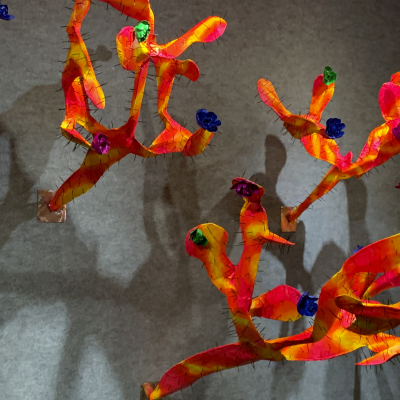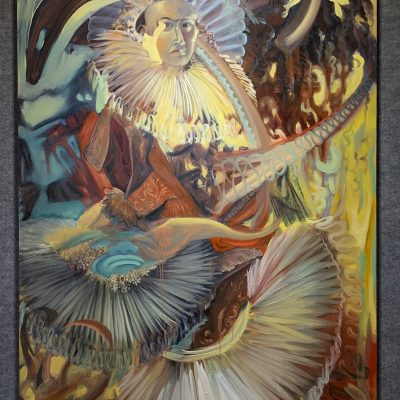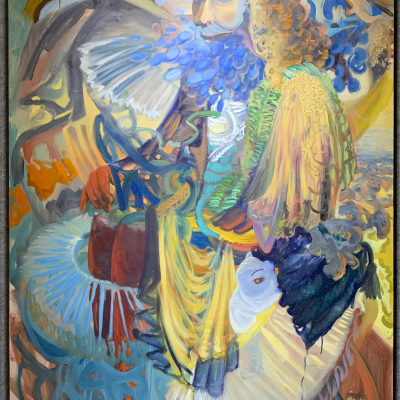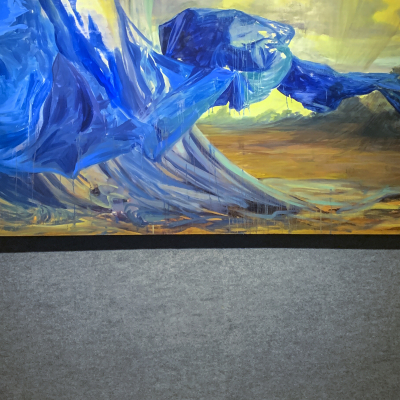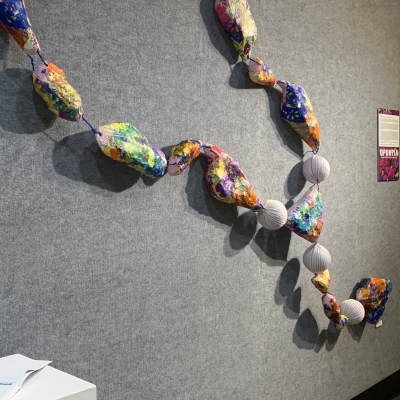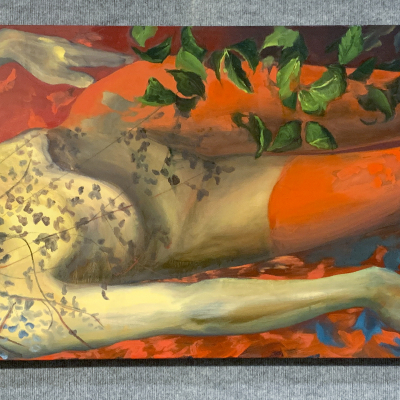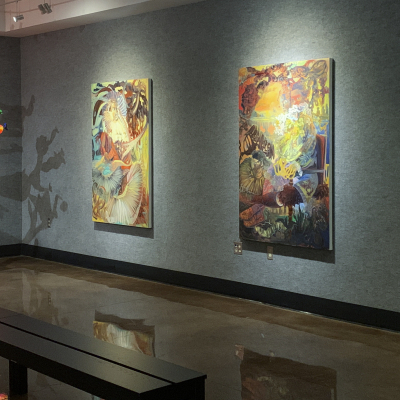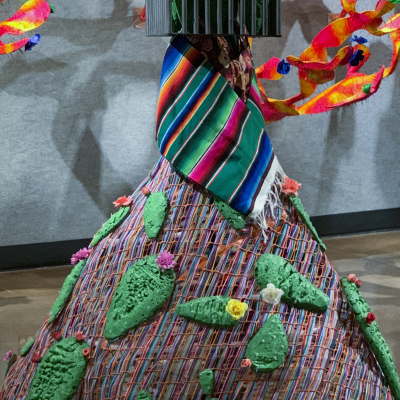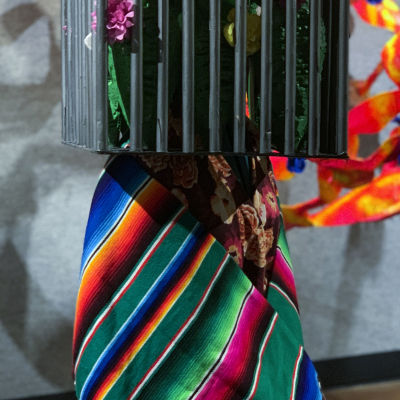Scott Azevedo and Maria Mariscal
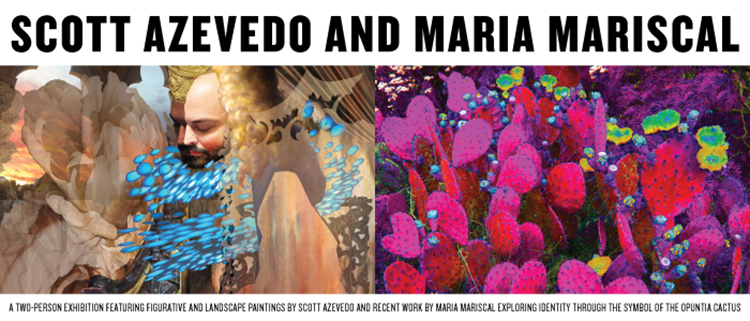
Scott Azevedo and Maria Mariscal
A two-person exhibition featuring figurative and landscape paintings by Scott Azevedo and recent work by Maria Mariscal exploring identity through the symbol of the opuntia cactus.
Gallery
Exibition Dates: December 6, 2021 - December 16, 2021
Artist Statement
Scott Azevedo: Colonized Skin and Veiled Landscapes
Featuring figurative and landscape paintings that question the master narrative of Western culture—the effects of European colonization on marginalized groups and the environment.
As a young boy, I spent my formative years in the South where I experienced subtle racism and homophobia from my neighbors, classmates, teachers, babysitters, and from my mother—most likely subtle because I was a young child. Having experienced such complicated issues at a very early age threw me out of the world most are privileged to live in. Instead, I experienced life in a shadow world, a place that is given little value by American society. It was not until my family moved to Northern California, at the end of fourth grade, that my identity received a specific title “stupid Mexican.” My fourth-grade teacher, Mr. Tucker—at home his name started with a different consonant—so graciously introduced me to a community that I apparently belonged to, the Latino community. Even in the Latino community I was rejected, not only because I was gay but also because I was not “Mexican” enough. This two-fold rejection made me feel extremely isolated, especially from my supposed Latino heritage. Throughout most of life I felt misunderstood, which greatly affected my self-worth, ultimately shaping my perspective as an American and now as a contemporary artist.
Dark and beautiful, my work straddles this in-between existence. As a painter, I struggle in finding imagery that evokes the issues and personal experiences I wish to convey: homophobia and colorism in America and the Latino community. My content is relentless and not easy to depict without it being too didactic. This exhibition is the visual result of that struggle and finding the right balance between content and the formal elements.
Maria Mariscal: Opuntia
Recent works exploring the opuntia cactus as a form and as a symbol for the Mexican people and the artist’s identity as a Chicana.
Maria Mariscal is a Chicana artist from Sacramento, California who is about to receive her Bachelor’s of Fine Arts in Studio Art Methods at Sacramento State. Opuntia is a showcase of the artist’s year-long exploration of the prickly pear cactus or nopal. Themes covered in this exhibition include the exploration of the subject’s form through different visual recreations and analyzing the relationship between the nopal and Mexican culture. Various topics are discussed in the work including the artist’s identity, Immigration, and the correlation between Mexican culture, feminism, and queerness.
Previously, the artist was studying other plant forms shortly before the country caught sight of what became known as “Kids in Cages”. This topic forced Mariscal to contemplate her position in the world, appreciate the risk her parents took as Mexican immigrants, and feel sorrow for those who are at the mercy of ICE. She gravitated toward studying plant forms that were more familiar to her childhood, one being the prickly pear cactus. The cacti appear in different forms, some resemble the actual plant while others are more abstract. Elements that are taken into consideration when creating a piece include the shape of the cacti pad, the size, the color, the needles, and the composition. Mariscal plays with each element while maintaining the essence of the nopal since it is the central theme. She also studied topics related to Mexican American culture including the Chicano Movement, the era that inspired her to create this body of work as a means of conversation. Through her work, she invites the viewer to discuss these topics and their existence in present-day America.
The cacti in each piece are used as a means of representation, in some cases, the cacti are a symbol for the Mexican people, sometimes they point to the culture, or they represent the artist herself. The seven-piece collage series, “Forced”, shows Mariscal’s perspective towards her upbringing. It uses the vibrantly colored Poppies and the prickly pear flowers to represent two different social spaces, California and Zacatecas, Mexico. The center collage displays both places in one space, yet they are still divided. “La Reina” is a costume piece that refers to immigration and culture. The headpiece is a representation of Mexicans north of the US/Mexico border, a cage rimmed with nopales, disguising the wearer’s face. The quinceanera skirt represents the south of the border, a colorful yarn pattern is woven into orange construction fencing, adorned by green cacti and flowers scattered across the surface. “La Princesa '' is a print that took inspiration from the piece, “Portrait of the Artist as the Virgin of Guadalupe” by Yolanda Lopez. Lopez reclaimed the Virgen of Guadalupe, a female Catholic icon. The Virgen of Guadalupe is typically represented as a reserved, submissive woman who needs a man to achieve anything. Lopez opposes this by recreating the Virgen in her image as a jogger that is wearing the cloak like a cape. She is not covered up and steps on the angel’s wing as a statement of agency and independence. Mariscal decided to adopt this narrative with the image of a female child who wears a crown and the cloak as a cape as well. She is surrounded by a vibrant aura and under the child, there is a forest of nopales in the place where the angel should be.
As the viewer observes this show, the artist wants them to use the work as a vehicle for a conversation about the topics discussed. She also wants the viewer to enjoy the different forms that the Opuntia take, and the space they occupy.
If you have any questions about the show, please contact the artist through her Instagram page @mariscal_m, or email, mariamariscalart@gmail.com.
Image Gallery
Quick Information
Name
The Gallery
Phone
916-278-7250
Email
Hours
Can’t find what you are looking for? Contact the University Union Info Desk at 916-278-6997 or email uuinfodesk@csus.edu
The University Union is located at California State University, Sacramento 6000 J Street, Sacramento, CA 95819
